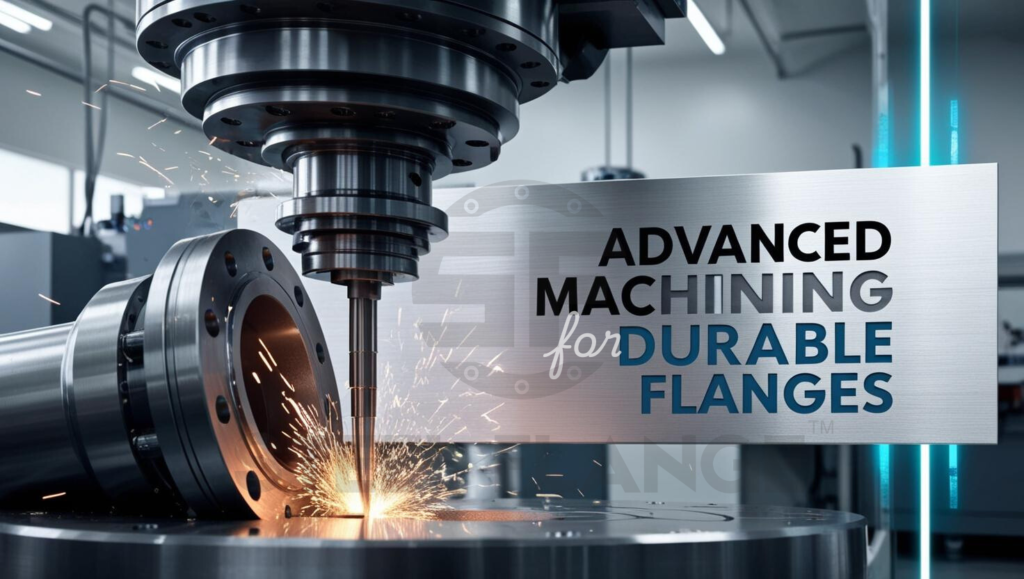How Advanced Machining Techniques Improve Flange Durability
In industrial piping, component durability is paramount. Flanges, critical connectors in piping systems, must endure high pressures, extreme temperatures, and corrosive environments without failure. Advanced machining techniques play a crucial role in enhancing flange durability, ensuring these components meet the rigorous demands of modern industries.
This blog explores how innovations in machining processes improve flange performance and longevity, and why investing in advanced manufacturing methods is essential for industrial projects.

1. The Importance of Flange Durability
Flanges are the backbone of secure piping connections in industries like oil and gas, power generation, water treatment, and petrochemicals. They are subjected to constant stress, making durability a critical factor in preventing:
System failures due to leaks or pressure breaches.
Costly downtimes are caused by frequent replacements or repairs.
Safety hazards in environments handling hazardous materials.
Ensuring durability begins with the precision and quality of the machining process.
2. Key Advanced Machining Techniques That Enhance Durability
a. CNC Machining for Precision Manufacturing
Computer Numerical Control (CNC) machining uses automated tools guided by pre-programmed software to achieve unmatched precision. This technology offers:
Tight Tolerances: Ensures exact dimensions for flanges, minimizing the risk of weak spots or misalignments.
Consistency: Every flange produced is identical in quality and specifications, reducing variability that could lead to structural weaknesses.
Complex Designs: Enables the production of intricate flange types like tongue-and-groove or lap joint flanges, which require precise cuts to maintain durability.
b. Cryogenic Treatment for Material Strength
Cryogenic treatment involves cooling flange materials to extremely low temperatures to enhance their structural properties. This technique:
Increases Hardness: Strengthens the flange material by reducing residual stresses.
Improves Wear Resistance: Makes flanges more resistant to friction and abrasion, extending their operational life.
Enhances Toughness: Reduces the risk of cracks or fractures under stress.
c. Automated Welding Processes
For welded neck flanges and similar designs, automated welding techniques like TIG (Tungsten Inert Gas) or MIG (Metal Inert Gas) welding ensure:
Uniform Joints: Prevents weak spots in welds, enhancing the overall strength of the flange.
Superior Fusion: Creates a seamless bond between components, reducing the risk of leaks.
d. Surface Finishing for Corrosion Resistance
Advanced finishing processes like electropolishing or sandblasting improve the surface quality of flanges. These techniques:
Remove Imperfections: Smooth out any micro-cracks or scratches that could initiate corrosion.
Enhance Coating Adhesion: Prepare the flange surface for protective coatings like epoxy or zinc plating.
Reduce Wear: Ensure surfaces are resistant to mechanical and chemical wear.
e. Multi-Axis Machining for Complex Geometries
Multi-axis CNC machines can work on flanges from multiple angles simultaneously, enabling:
Enhanced Designs: Creation of flanges with custom geometries suited for unique industrial requirements.
Increased Load Capacity: Geometrically optimized flanges distribute stress more effectively, preventing deformation.
3. Materials and Their Role in Durability
Advanced machining techniques allow manufacturers to work with a variety of durable materials, such as:
Stainless Steel: Highly resistant to corrosion and suitable for high-temperature applications.
Carbon Steel: Offers excellent strength and affordability for heavy-duty projects.
Alloy Steel: Provides enhanced wear resistance and toughness for extreme conditions.
Machining techniques like heat treatment further enhance these materials, optimizing their mechanical properties for industrial use.
4. The Benefits of Investing in Advanced Machining for Flanges
a. Longer Service Life
High-precision machining ensures flanges are less prone to wear and tear, significantly extending their lifespan.
b. Reduced Maintenance Costs
Durable flanges require less frequent replacement, lowering maintenance expenses and operational downtime.
c. Improved Safety Standards
Precision machining minimizes the risks of flange failure, enhancing overall system safety in critical applications.
d. Sustainability
Long-lasting flanges reduce waste, aligning with the growing emphasis on sustainable manufacturing practices.
5. Real-world applications of Machined Flanges
Industries benefiting from advanced machining techniques include:
Oil and Gas: High-pressure flanges resist extreme conditions in offshore drilling platforms.
Chemical Processing: Corrosion-resistant flanges handle aggressive chemical flows without degradation.
Power Generation: Heat-treated flanges maintain integrity in steam and gas turbine systems.
6. Choosing a Reliable Manufacturer for Durable Flanges
When sourcing flanges, look for manufacturers that:
Employ state-of-the-art machining technologies.
Offer certifications like ISO 9001 for quality assurance.
Conduct rigorous testing, including pressure and corrosion resistance checks.
Provide customization options to meet unique industrial needs.
Conclusion
The durability of steel flanges directly impacts the safety, efficiency, and cost-effectiveness of industrial systems. Advanced machining techniques, such as CNC precision, cryogenic treatment, and automated welding, have revolutionized flange manufacturing, ensuring these critical components can withstand the toughest conditions.
By investing in high-quality, expertly machined flanges, industries can enhance system reliability, reduce long-term costs, and maintain the highest safety standards. Choose a trusted flange manufacturer to ensure your projects benefit from the best in modern machining technology.
